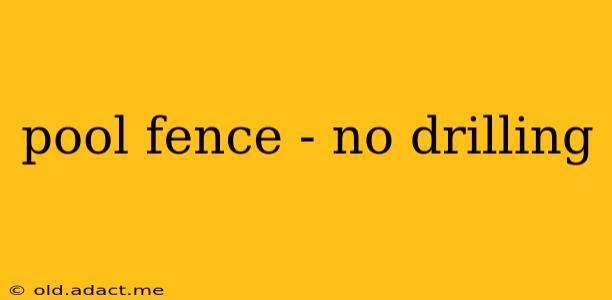Keeping your loved ones safe around your pool is paramount. A sturdy pool fence is essential, but the thought of drilling holes in your deck, patio, or landscaping can be daunting. Fortunately, there are many effective and aesthetically pleasing pool fence options that require no drilling at all. This guide explores these alternatives, helping you choose the best solution for your home and budget.
What are the Benefits of a No-Drill Pool Fence?
Choosing a no-drill pool fence offers several significant advantages:
- Preservation of Property: Avoids damaging your existing decking, paving, or landscaping. This is especially important for rented properties or those with valuable surfaces.
- Easier Installation: Installation is generally quicker and simpler, often requiring less specialized tools and expertise. This translates to lower labor costs.
- Increased Property Value (Potentially): A well-maintained, attractive pool fence can enhance your property's value, and avoiding drilling damage helps maintain that value.
- Flexibility: No-drill fences can be easily relocated or removed if needed, providing flexibility for future landscaping changes.
Different Types of No-Drill Pool Fence Systems
Several effective no-drill pool fence systems exist, each with its unique features and advantages:
1. Clamp-on Pool Fences
These fences utilize clamps or brackets to attach to existing structures like decks, patios, or walls. They're a popular choice because of their ease of installation and removal. The clamps grip firmly, providing a secure fence without the need for drilling. However, ensure the clamps are rated for the weight of the fence and are securely fastened to a strong supporting structure.
2. Self-Standing Pool Fences
Self-standing pool fences are freestanding units that don't require any attachment to existing structures. These fences often use weighted bases or ground spikes for stability. They are highly portable and ideal for renters or those who prefer a temporary solution. However, they might not be as aesthetically pleasing as other options, and their stability depends heavily on the ground conditions.
3. Tension Pool Fences
Tension fences use tension wires or cables to create a barrier between posts. These posts are typically installed in the ground using sleeves or brackets that don’t require drilling. They offer a sleek, modern look, but the tension system needs to be properly adjusted to ensure stability and safety.
4. Mesh Pool Fences
Mesh pool fences, available in various styles and materials, can be installed using no-drill methods. These frequently utilize clamp-on systems or weighted bases, providing a lightweight yet sturdy barrier.
How to Choose the Right No-Drill Pool Fence
Selecting the best no-drill pool fence depends on several factors:
- Your Budget: Prices vary significantly between different types of fences and materials.
- Your Property: Consider the existing structures (decks, patios, walls) and the surrounding landscape when choosing a fence type.
- Your Aesthetic Preferences: No-drill fences come in various styles and colors, allowing you to choose a fence that complements your home's design.
- Local Regulations: Check with your local building codes and homeowner's association to ensure compliance with regulations.
Are No-Drill Pool Fences as Safe as Drilled Fences?
While no-drill pool fences might seem less secure, reputable manufacturers produce high-quality options that meet or exceed safety standards. The key is to choose a fence that's appropriately sized and installed correctly, according to the manufacturer's instructions. Always ensure the chosen fence meets your local building codes regarding height and gate latch mechanisms. Regular inspection and maintenance are crucial regardless of the installation method.
What are the common materials used in no-drill pool fences?
Common materials include aluminum, vinyl, and composite materials. Aluminum is lightweight, durable, and low maintenance, while vinyl offers similar benefits with a wider range of color options. Composite materials combine the best features of wood and plastic, providing a long-lasting, attractive fence.
How much do no-drill pool fences cost?
The cost varies widely based on the size, style, material, and complexity of the installation. It's best to get quotes from multiple suppliers to compare prices and ensure you're getting the best value for your money.
By carefully considering the various types and factors involved, you can choose a safe, effective, and attractive no-drill pool fence that protects your loved ones and enhances your property without compromising its integrity. Remember to always prioritize safety and comply with local regulations.
